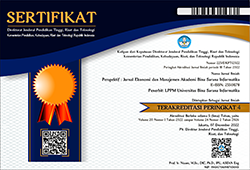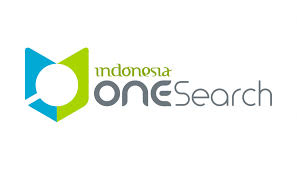Information System Success Model pada Aplikasi ALAMI Sharia
Abstract
Full Text:
PDFReferences
Abidin, A., Zahra, N. S., & Yusuf, A. (2023). Kesuksesan Aplikasi Kredivo Berdasarkan Information System Success Model (ISSM). Jurnal Maksipreneur, 12(No. 2), 602–616. https://doi.org/http://dx.doi.org/10.30588/jmp.v12i2.1045
Alam, A., & Saputro, I. A. (2022). A Qualitative Analysis of User Interface Design on a Sharia Fintechapplication Based on Technology Acceptance Model (Tam). Jurnal TAM (Technology Acceptance Model), 13(1), 9. https://doi.org/10.56327/jurnaltam.v13i1.1142
Alkraiji, A. I. (2021). An examination of citizen satisfaction with mandatory e-government services: comparison of two information systems success models. Transforming Government: People, Process and Policy, 15(1), 36–58. https://doi.org/10.1108/TG-01-2020-0015
Alsmadi, A. A., Aalrawashdeh, N., Al-Gasaymeh, A., Al_hazimeh, A. M. d., & Alhawamdeh, L. (2023). Adoption of Islamic Fintech in lending services through prediction of behavioural intention. Kybernetes, March. https://doi.org/10.1108/K-10-2022-1362
Alyoussef, I. Y. (2023). Acceptance of e-learning in higher education: The role of task-technology fit with the information systems success model. Heliyon, 9(3), e13751. https://doi.org/10.1016/j.heliyon.2023.e13751
Aulia, M., Yustiardhi, A. F., & Permatasari, R. O. (2020). An overview of Indonesian regulatory framework on Islamic financial technology (fintech). Jurnal Ekonomi & Keuangan Islam, 6(1), 64–75. https://doi.org/10.20885/jeki.vol6.iss1.art7
Choi, W., Rho, M. J., Park, J., Kim, K. J., Kwon, Y. D., & Choi, I. Y. (2013). Information system success model for customer relationship management system in health promotion centers. Healthcare Informatics Research, 19(2), 110–120. https://doi.org/10.4258/hir.2013.19.2.110
Chusnah, & Indriana, K. T. (2020). Pengaruh Kemudahan dan Keamanan Terhadap Kepuasan Konsumen Fintech”. Kinerja Jurnal Ekonomi Dan Bisnis, 3 No 1.
Cidral, W. A., Oliveira, T., Di Felice, M., & Aparicio, M. (2018). E-learning success determinants: Brazilian empirical study. Computers and Education, 122, 273–290. https://doi.org/10.1016/j.compedu.2017.12.001
Dawood, H., Al Zadjali, D. F., Al Rawahi, M., Karim, D. S., & Hazik, D. M. (2022). Business trends & challenges in Islamic FinTech: A systematic literature review. F1000Research, 11, 1–27. https://doi.org/10.12688/f1000research.109400.1
Franque, F. B., Oliveira, T., & Tam, C. (2021). Understanding the factors of mobile payment continuance intention: empirical test in an African context. Heliyon, 7(8), e07807. https://doi.org/10.1016/j.heliyon.2021.e07807
Gable, G. G., Sedera, D., & Chan, T. (2008). Re-conceptualizing information system success: The IS-impact measurement model. Journal of the Association for Information Systems, 9(7), 377–408. https://doi.org/10.17705/1jais.00164
Glavina, S., Aidrus, I., & Trusova, A. (2021). Assessment of the Competitiveness of Islamic Fintech Implementation: A Composite Indicator for Cross-Country Analysis. Journal of Risk and Financial Management, 14(12), 602. https://doi.org/10.3390/jrfm14120602
Harlie, M., Hairul, Rajiani, I., & Abbas, E. W. (2019). Managing information systems by integrating information systems success model and the unified theory of acceptance and usage of technology. Polish Journal of Management Studies, 20(1), 192–201. https://doi.org/10.17512/pjms.2019.20.1.17
HAryono, S. (2017). Metode SEM Untuk Penelitian Manajemen AMOS Lisrel PLS (1 st). PT Luxima Metro Media.
Iivari, J. (2005). An Empirical Test of the DeLone-McLean Model of Information System Success. Data Base for Advances in Information Systems, 36(2), 8–27. https://doi.org/10.1145/1066149.1066152
Jen, W. Y., & Chao, C. C. (2008). Measuring mobile patient safety information system success: An empirical study. International Journal of Medical Informatics, 77(10), 689–697. https://doi.org/10.1016/j.ijmedinf.2008.03.003
Juliandi, A. (2014). Metodologi Penelitian Bisnis. Umsu Pers.
Karjaluoto, H., Shaikh, A. A., Saarijärvi, H., & Saraniemi, S. (2019). How perceived value drives the use of mobile financial services apps. International Journal of Information Management, 47(August), 252–261. https://doi.org/10.1016/j.ijinfomgt.2018.08.014
Katadata.co.id. (2022). Daftar Negara dengan Fintech Syariah Terbanyak, Indonesia Juaranya. Databoks.Katadata.Co.Id. https://databoks.katadata.co.id/datapublish/2022/09/15/daftar-negara-dengan-fintech-syariah-terbanyak-indonesia-juaranya
Kurnianingsih, M., Azhari, A. F., Dimyati, K., Absori, A., Wardiono, K., Kuswardhani, K., & Nurrachman, A. D. (2022). Criminal Victimization: Women and Fintech Financing from the Theory of Lifestyle Exposure. International Journal of Multicultural and Multireligious Understanding, 9(2), 157. https://doi.org/10.18415/ijmmu.v9i2.3357
Maqableh, M., Hmoud, H. Y., Jaradat, M., & Masa’deh, R. (2021). Integrating an information systems success model with perceived privacy, perceived security, and trust: the moderating role of Facebook addiction. Heliyon, 7(9), e07899. https://doi.org/10.1016/j.heliyon.2021.e07899
Menne, F., Surya, B., Yusuf, M., Suriani, S., Ruslan, M., & Iskandar, I. (2022). Optimizing the Financial Performance of SMEs Based on Sharia Economy: Perspective of Economic Business Sustainability and Open Innovation. Journal of Open Innovation: Technology, Market, and Complexity, 8(1). https://doi.org/10.3390/joitmc8010018
Misissaifi, M., & Sriyana, J. (2021). Faktor-Faktor Yang Mempengaruhi Minat Menggunakan Fintech Syariah. IQTISHADUNA: Jurnal Ilmiah Ekonomi Kita, 10(1), 109–124. https://doi.org/10.46367/iqtishaduna.v10i1.276
Mohammadi, H. (2015). Investigating users’ perspectives on e-learning: An integration of TAM and IS success model. Computers in Human Behavior, 45, 359–374. https://doi.org/10.1016/j.chb.2014.07.044
Nugraha, D. P., Gufron, I. A., Pringgondani, P., & Ilhamdi, I. (2022). The Effect of Sharia Financial Literature, Government Support and Sharia Fintech on MSME Sustainability. Enrichment: Journal of Management, 12(2), 1365–1372.
Okonkwo, C. W., Amusa, L. B., & Twinomurinzi, H. (2023). Mobile wallets in cash-based economies during COVID-19. 123(2), 653–671. https://doi.org/10.1108/IMDS-01-2022-0029
Rabbani, M. R., Bashar, A., Nawaz, N., Karim, S., Ali, M. A. M., Rahiman, H. U., & Alam, M. S. (2021). Exploring the role of islamic fintech in combating the aftershocks of covid-19: The open social innovation of the islamic financial system. Journal of Open Innovation: Technology, Market, and Complexity, 7(2). https://doi.org/10.3390/joitmc7020136
Rai, A., Lang, S. S., & Welker, R. B. (2002). Assessing the validity of IS success models: An empirical test and theoretical analysis. Information Systems Research, 13(1), 50–69. https://doi.org/10.1287/isre.13.1.50.96
Rakhmah, S. N., & Widyastuty, W. (2019). Mengukur Tingkat Kesuksesan Website E-Government pada Sistem Seleksi CPNS Nasional (SSCN) Menggunakan Model Delone Mclean. Inti Nusa Mandiri, 14(1), 129–138.
Rusydiana, A. (2019). Bagaimana Mengembangkan Industri Fintech Syariah di Indonesia? Pendekatan Interpretive Structural Model (ISM). Al-Muzara’ah, 6(2), 117–128. https://doi.org/10.29244/jam.6.2.117-128
Sabherwal, R., Jeyaraj, A., & Chowa, C. (2006). Information system success: Individual and organizational determinants. Management Science, 52(12), 1849–1864. https://doi.org/10.1287/mnsc.1060.0583
Talwar, S., Dhir, A., Khalil, A., Mohan, G., & Islam, A. K. M. N. (2020). Point of adoption and beyond. Initial trust and mobile-payment continuation intention. Journal of Retailing and Consumer Services, 55, 102086. https://doi.org/10.1016/j.jretconser.2020.102086
Tam, C., Loureiro, A., & Oliveira, T. (2020). The individual performance outcome behind e-commerce: Integrating information systems success and overall trust. Internet Research, 30(2), 439–462. https://doi.org/10.1108/INTR-06-2018-0262
Tam, C., & Oliveira, T. (2016). Understanding the impact of m-banking on individual performance: DeLone & McLean and TTF perspective. Computers in Human Behavior, 61(May 2018), 233–244. https://doi.org/10.1016/j.chb.2016.03.016
Tam, C., & Oliveira, T. (2017). Understanding mobile banking individual performance: The DeLone & McLean model and the moderating effects of individual culture. Internet Research, 27(3), 538–562. https://doi.org/10.1108/IntR-05-2016-0117
Towoliul, J. E. ., & Tumbuan, W. J. F. . (2017). Pengaruh Faktor Pribadi dan Faktor Keluarga Terhadap Keputusan Pembelian di Rumah Makan Waroeng Tepi Laut, Manado. Jurnal EMBA, 5(2), 308–322.
Wiwesa, N. R. (2021). USER INTERFACE DAN USER EXPERIENCE UNTUK MENGELOLA. Jurnal Sosial Humaniora Terapan, 3(2).
Wu, R. Z., & Tian, X. F. (2021). Investigating the impact of critical factors on continuous usage intention towards enterprise social networks: An integrated model of is success and ttf. Sustainability (Switzerland), 13(14). https://doi.org/10.3390/su13147619
Xu, F., & Du, J. T. (2018). Factors influencing users’ satisfaction and loyalty to digital libraries in Chinese universities. Computers in Human Behavior, 83, 64–72. https://doi.org/10.1016/j.chb.2018.01.029
Yahya, A. (2021). Sharia Fintech Development in Indonesia. EAI Innovating Research. https://doi.org/10.4108/eai.17-7-2020.2302984
Yahya, A., Affandy, A., & Narimawati, U. (2020). Pengembangan UMKM Melalui Pemanfaatan Model Layanan Fintech Syariah Ammana.id. Is The Best Accounting Information Systems and Information Technology Business Enterprise This Is Link for OJS Us, 5(2), 106–120. https://doi.org/10.34010/aisthebest.v5i2.3049
Yakubu, M. N., & Dasuki, S. I. (2018). Assessing Elearning Systems Success In Nigeria An Application Of The Delone And Mclean Information Systems Success Model. 17(2), 1–14.
Zaied, A. N. H. (2012). An Integrated Success Model for Evaluating Information System in Public Sectors. … of Emerging Trends in Computing and Information …, 3(6), 814–825. http://www.doaj.org/doaj?func=fulltext&aId=1093381
DOI: https://doi.org/10.31294/jp.v22i1.16669
Copyright (c) 2024 Novy Fitri Khotimah, Abdul Yusuf

This work is licensed under a Creative Commons Attribution-ShareAlike 4.0 International License.
dipublikasikan oleh LPPM Universitas Bina Sarana Informatika Jakarta
Jl. Kramat Raya No.98, Kwitang, Kec. Senen, Kota Jakarta Pusat, DKI Jakarta 10450

This work is licensed under a Creative Commons Attribution-ShareAlike 4.0 International License










